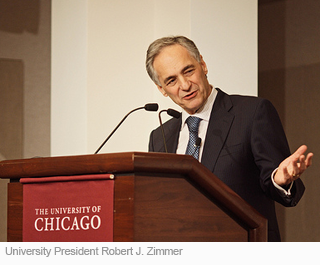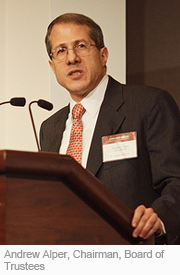
President Zimmer
January 11, 2012
As the Becker Friedman Institute made its debut in New York City, University President Robert J. Zimmer opened the inaugural event with remarks that defined the tradition of Chicago economics that the Institute preserves and extends.
“When I think of Chicago economics, four features stand out,” Zimmer said. “First, it’s a deeply data-driven, empirical, scientific approach to economics. Ultimately, it’s the marriage of data and theory that is so important to driving the Chicago approach. Theory without data is incoherent. Data without theory is sterile.
“Another feature is one that is familiar to everyone in this room: the deep importance of free markets and incentives for explaining behavior and policies,” Zimmer continued. He noted that although this is the aspect most strongly associated with Chicago, it manifests itself in different ways across the faculty. Still, he said, it’s a dominant theme—one that has spilled over into the UChicago administration.
 “A third feature is the remarkable way economic science has been carried into other domains. Whether in business, law, or sociology, the nature of economic thought has an enormous amount to say when applied in these and other disciplines,” Zimmer noted. “Of course, Gary Becker himself had an enormous influence on that.”
“A third feature is the remarkable way economic science has been carried into other domains. Whether in business, law, or sociology, the nature of economic thought has an enormous amount to say when applied in these and other disciplines,” Zimmer noted. “Of course, Gary Becker himself had an enormous influence on that.”
The fourth feature Zimmer highlighted was the global impact of Chicago economics. Free market ideology and the ideas of Friedman, Becker, and their colleagues have inspired political and economic revolutions and literally changed nations.
Zimmer spoke of the opening of the University’s Beijing Center in China in September 2010, which was held at the famed Great Hall of the People, the legislative and ceremonial center of the Communist Party of China. “We had three Nobel laureates in economics there; I was really struck by that moment, when the University of Chicago Economics Department arrived at the Great Hall of the People,” he recalled.
Zimmer said that whenever he speaks with an audience in China, he is always asked about the University’s secret for winning so many Nobel Prizes. “The answer is twofold. First, you have to have the right people,” he said. The second secret weapon is Chicago’s intellectual culture “of enormous discussion, debate, challenging ideas, and no deference to authority,” he added. “In a discussion, it’s not a matter of who is the graduate student and who is the Nobel laureate; it’s a case of who’s argument is right. I always use the Economics Department workshops as an example.”
For example, Zimmer recalled that while he was preparing his remarks for Milton Friedman’s memorial service, Nobel laureate James Heckman pointed him to Friedman’s famous paper on positive economics. Zimmer quoted the paper in his remarks, only to have another longtime Friedman colleague and fellow laureate Robert Lucas find him after the service to say, “You know, I have a problem with that paper …”
“Even at Milton Friedman’s memorial, people are still arguing with his paper,” Zimmer noted, to laughter from the crowd.
“What we want to do with the Becker Friedman Institute, in the spirit of making no small plans, is to make this the premier intellectual destination for that kind of rigorous, challenging inquiry. We want to preserve the methodology that has allowed Chicago economics to be so effective over the years and expand that in a dramatic way,” Zimmer said.
 In closing the event, Andrew Alper, AB’80, MBA’81, Chairman of the University’s Board of Trustees, noted, “I don’t think it would be too controversial to say in this room that Chicago economics has had a huge influence on the world. It also has affected a lot of us personally.
In closing the event, Andrew Alper, AB’80, MBA’81, Chairman of the University’s Board of Trustees, noted, “I don’t think it would be too controversial to say in this room that Chicago economics has had a huge influence on the world. It also has affected a lot of us personally.
“I was attracted to Milton Friedman for the clarity and simplicity of his views. I came to Chicago in 1976 and basically haven’t left since. A lot of you probably have similar stories with personal connection to Friedman Becker, Murphy, and others.”
Alper joined Zimmer in thanking the many faculty members, in particular founding director Lars Peter Hansen, as well as the administration and trustees, for their hard work and tenacity in bringing the idea of the Institute to fruition.
“I hope we can all agree that the world will be better for the institute having been formed,” Alper said.
